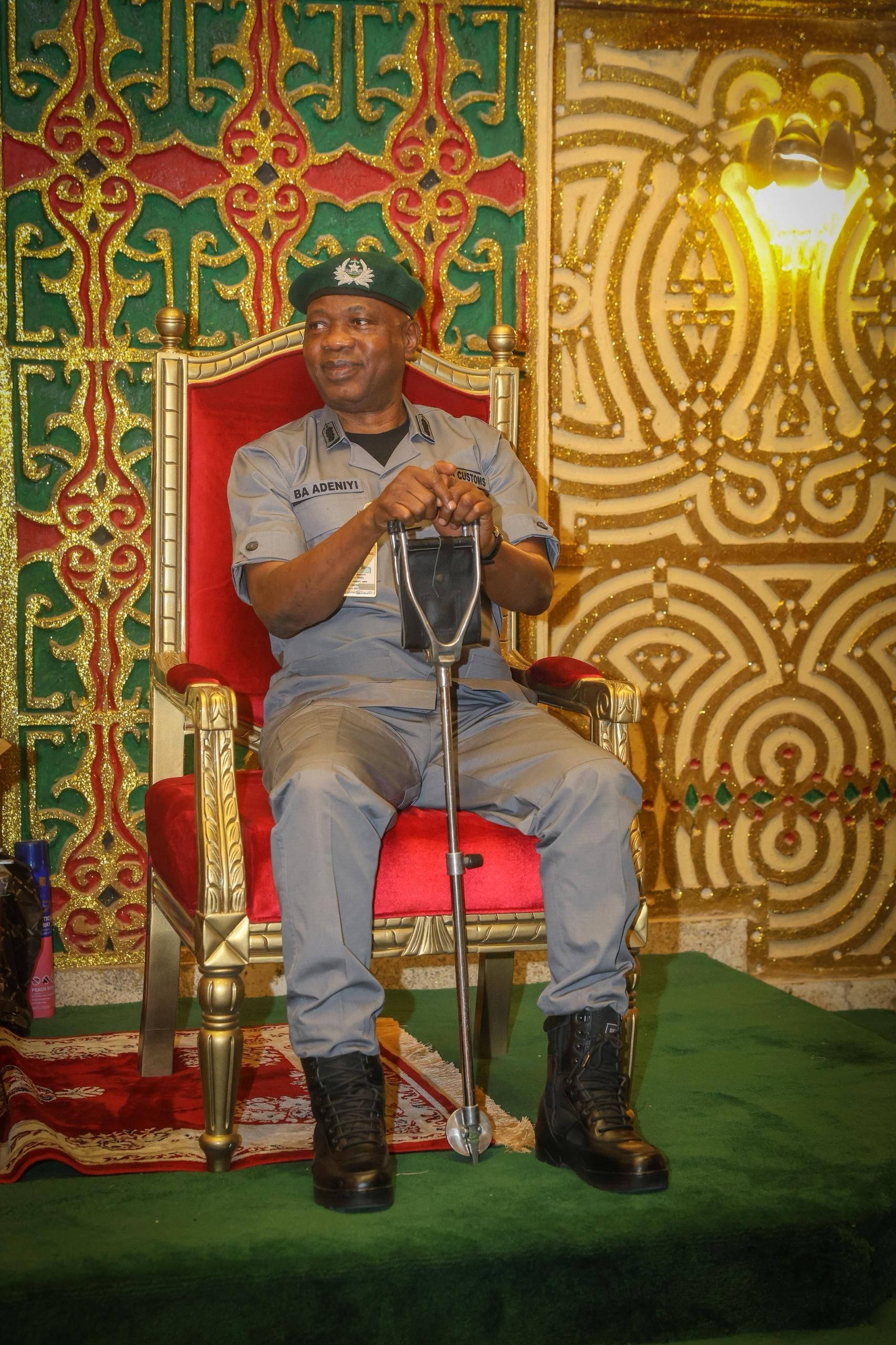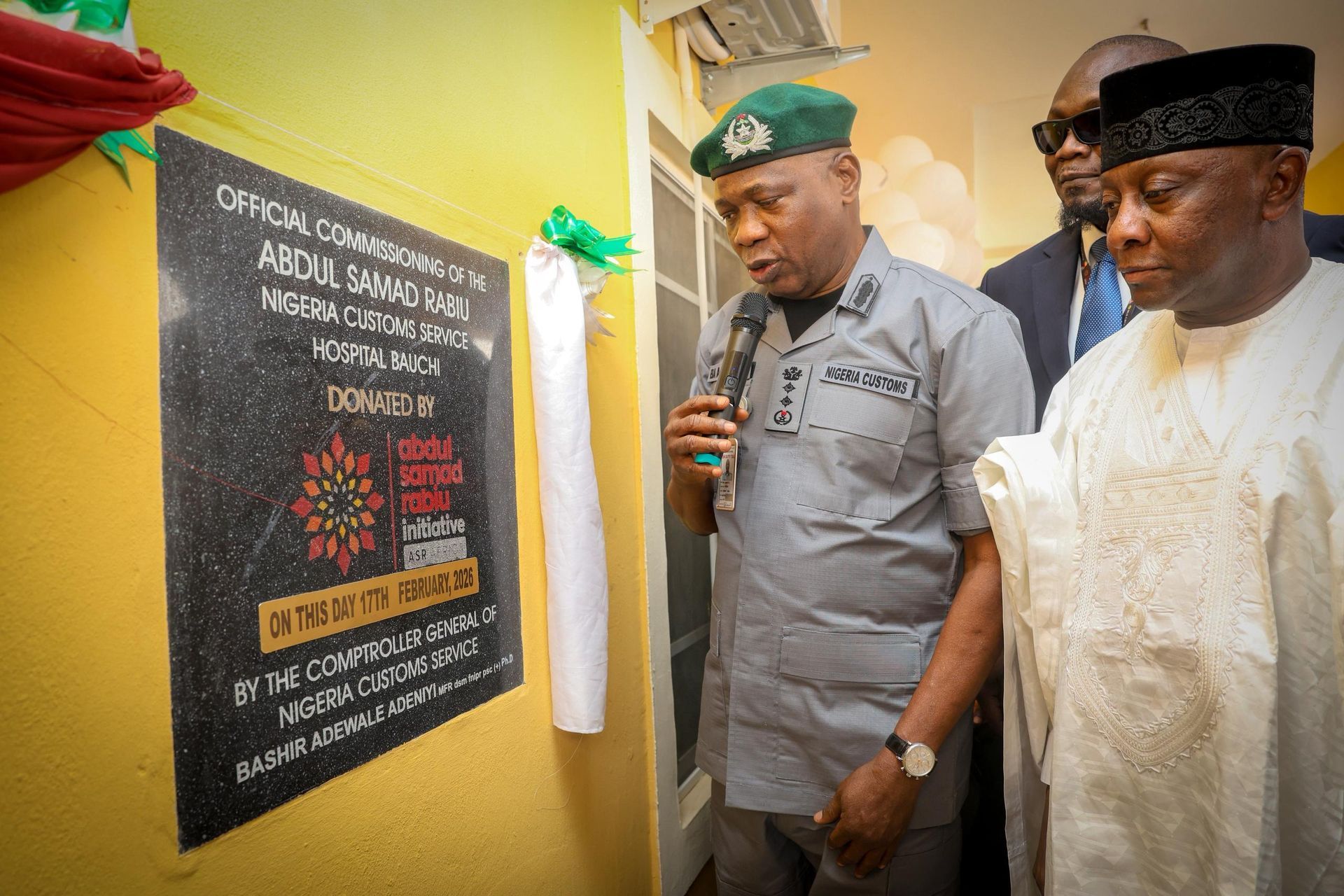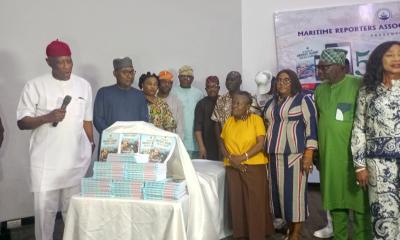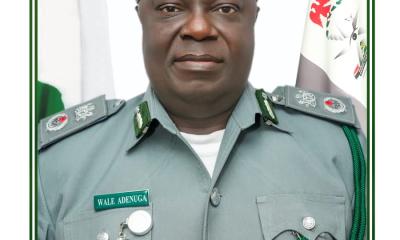Customs
MBA Musa: a silent working machine at Tin Can Customs

His mien gives him away as a harmless, non-assuming introvert.
But beneath his calm look lies a tough, determined and uncompromising work attitude that has distinguished the Tin Can command of the Nigeria Customs service as one of the biggest revenue baskets of the service.
Musa Baba Abdulahi(MBA), the Customs Area Comptroller of the Tin Can command, bestrides the command like a gentle giant.
He presides over the command reputed as the second cash cow for the Nigeria Customs Service with unassuming dexterity and clinical efficiency.
Musa is not given to publicity. He hardly grants press interviews.
He loathes calling the press to flaunt his achievements at the command.
He believes that aspect is better handled by his equally versatile Public Relations Officer, Uche Ejesieme, who has equally mastered and emulated the work ethics of his boss.
While he leaves the talking to his spokesman, Musa marshals his officers to do the work he was mandated: revenue collection, trade facilitation, discouragement of anti- illicit practices such as importation of contraband and seamless Customs operations.
He believes his works and achievements are enough to publicise him.
So, while his colleagues enjoy generous publicity, Musa daily buries his head in his works, churning out impressive results which have consistently screamed the name of the command to the hearing of his superior officers at Abuja.
His consistent impressive performance at the command has however adequately compensated for his almost anonymity at the unit.
No wonder his no-nonsense boss, Col. Hammed Ali, the Comptroller-General of Customs, seems to have ” forgotten” to redeploy him from the command as the case of other area Comptrollers whom he changes at will.Against the norm of high mortality of the tenures of Area Comptrollers at the Commands, Musa has spent three years two months so far as the helmsman of the Tin Can Command.
And the CGC seems not in a hurry to look in his direction for a change yet except when it is time for his elevation to the next rank.
Whoever knows the practice of the CGC who shuffles his field commanders at the drop of his hat, then the ‘ long’ and running tenure of Musa is a feat “unheard of” under the administration of Col. Ali.
While all other commands, especially the ‘grade A’ commands, have experienced multiple turnovers of the CACs in the past years, the Tin Can Command has enjoyed relative stability in terms of changes in helmsmen since February 2018 when Musa berthed at the Tin Can Command.
But it would be fallacious to assume that the eagle- eye, highly mobile CGC overlooked or ‘forgot’ to include Musa in the litany of redeployments that have come to characterise his administration, but it seems Musa is “playing the match according to the match plan” of his coach.
In football, you don’t change a winning team.
At his resumption of office as the CGC in September 2015, Hameed Ali pointedly told his senior officers in Abuja about his unambiguous mission to the Customs.
“I have come to carry out the mandate of Mr. President to reform Customs, to restructure Customs, and to increase the revenue generation.
“I don’t think that is ambiguous. I don’t think that is cumbersome. It is precise and I believe that is what all of you are here to do” the CGC had then said six years ago.
So Musa has stayed this long because he knew and mastered the rules of engagement.
Statistics show why Musa has wormed his way into the heart of his boss, a feat that is almost inconceivable given the deadpan expression the CGC always wears which gives him away as someone who doesn’t indulge in needless emotions.
When he was redeployed from the office of the CGC to Tin Can Command on February 1st, 2018, Musa had a clear understanding of his vision and mission to the command.
“Part of my key mandates includes trade facilitation, driving of seamless ease of doing business, provision of coordinating roles in port operations, and strict maintenance of national security at the ports.
“The Command will continue to maintain lead in revenue generation which remains a core function of the Customs,” he said at his maiden press conference in 2018.
“The comparative analysis of quarter one revenue collection from 2018 to 2021 are as follows: in 2018, N76,789,721,107.42; in 2019, N78,857,106,168.27; and in 2020, N91,635,998,490.73,” the customs boss said
“This improvement is despite the twin threat to lives and livelihood posed by the COVID-19 pandemic. The command has inspired their officers to continue to work hard while observing all the safety measures to achieve the best of performance.
“We kept our lines of communication open and concerted effort was made to ensure that the supply chain is not disrupted,” Musa said of the geometric increase in revenue performance since he took over.
The success of Musa lies in his heavy deployment of technology to track revenue, plug revenue leakages, and reduce excessive physical contacts between officers and the trading public which he believes will minimise corruption.
He also put much emphasis on building human capacity as he believes well-trained and motivated officers will enhance efficient service delivery.
As a result, officers are being trained on a regular basis on some of the core functions of the customs in the areas of classification, risk management, and data management, the areas in which Musa himself is well versed as a Mining Engineer who joined the service as a Cadet Officer in 1990, and had undergone several trainings in Valuation and Classification, which are the core duties of the Nigerian Customs Service.
Trade facilitation holds as much passion for Musa as revenue generation.
This was why at his resumption of duties in 2018, he reinvigorated the Dispute Resolution Committee (DRC) which he personally heads, and made his PRO the deputy to sit daily and resolve all issues arising from valuation within six hours.
This was unlike the previous arrangement when the committee sat two times a week.
He also deployed and beefed up the Time Release study tool to determine the actual time required for the release and clearance of goods right from the time the cargo arrives to the physical release from Customs’ control.
Time Release study was a strategic tool that was capable of identifying bottlenecks in the trade value chain and creating an enabling environment for effective and efficient customs operations.
Musa made judicious use of all these tools and methods which create a conducive, customers- friendly environment that facilitate the quick clearance of goods and which in turn boosts his revenue drive.
Customs
Customs collects N1.585 trillion from 51 compliant traders under AEO programme

Customs
Customs takes delivery, commissions 60- bed hospital donated by BUA Group in Bauchi

Customs
Ahead of Customs’ paperless operations in June, Comptroller Onyeka declares Tin Can Customs trade enabler

-

 Headlines3 months ago
Headlines3 months agoEx-NIWA boss, Oyebamiji, emerges most media-friendly CEO in maritime industry
-

 Headlines3 days ago
Headlines3 days agoFIFA sends Nigeria’s Super Eagles to 2026 World Cup, awards boardroom scoreline of 3 goals to nil against DR Congo
-

 Headlines3 months ago
Headlines3 months agoMARAN pulls industry’s stakeholders to unveil its iconic book on Maritime industry.
-

 Customs3 months ago
Customs3 months agoHow Comptroller Adenuga is raising revenue profile of Seme command, facilitating regional trade.
-

 Headlines3 months ago
Headlines3 months agoNigeria showcases readiness for compliance with IMO decarbonization policy at Brazil conference
-

 Headlines3 months ago
Headlines3 months agoOndo govt inaugurates former NIMASA Director, Olu Aladenusi, as Special Aide on Marine and Blue Economy

